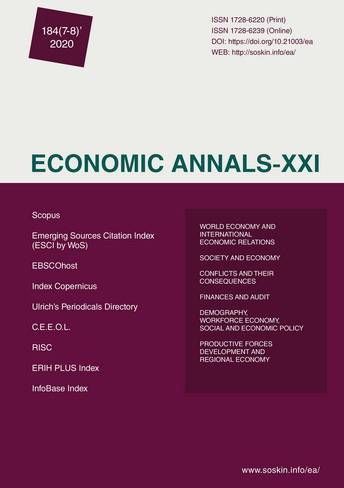Methodological architectonics of inclusive circular economy for eco-security of society under pandemic
Methodological architectonics of inclusive circular economy for eco-security of society under pandemic
Author(s): Andriy Krysovatyy, Roman Zvarych, Iryna Zvarych, Ihor Krysovatyy, Kateryna KrysovataSubject(s): Economy, Health and medicine and law, ICT Information and Communications Technologies
Published by: Institute of Society Transformation
Keywords: Inclusiveness; Circularity; Circular Economy; Inclusive Growth; Eco-security; Methodology; Ecology; Value Chain; Self-organization;
Summary/Abstract: The transition from a linear to a circular economy is determined by the change in the positioning of global risks from year to year, which determines the vectors of such changes. Thus, the main risks for 2020 are those related to the environment and occupying the first positions in the rating for the last three years (in particular, in 2019, the risk of extreme weather events). The gradual increase in awareness of this risk has led to a change in the sentiment of both producers and consumers. Experts assessed climate change as a major risk in 2019, outpacing cyberattacks, financial instability and terrorism. Thus, to mitigate this risk in 2020 and future periods, the global business community should implement circular «designs», reducing resource use and prioritizing low carbon materials. The potential effects of the transition to a circular economy on greenhouse gas emissions are significant, mainly achieved by improving resource efficiency, increasing the useful life of buildings and assets, increasing recycling and reuse, and completely reducing primary raw material use. Thus, the circular economy can be seen as an effective strategy for promoting climate change mitigation. The poly-paradigmatic nature of economic knowledge from the standpoint of the existential nature of the imperatives of economic development in the context of responsibility to the global future causes certain paradigm shifts, and greening is the mainstream and imperative that reflects the heterodox beginning of the theorico-cyclological methodology. Multidisciplinary epistemological perspective for the analysis of economic phenomena from the standpoint of the new pragmatism in the context of the «triad» of sustainability (economic, social and ecological components), distinguishes the humanitarianism of economic science and positions «in the foreground» the role of values in the economic activity of people and society (acceleration of exploitation of natural resources; climate change; the formation of a new environmental order; environmental and food security) and the dominant paradigm formation (exceeding the environmental limit; Paris agreement; changing public sentiment of fossil producers and businesses; global economic losses; UN sustainable development goals with strong circular practices; WTO involvement in supporting new technologies, minimizing waste production and promoting circular trade). The methodological features of the paradigm of the global inclusive circular economy from the standpoint of postmodernism are the strengthening of socio-humanistic orientations (reflecting its ideology and creating the basis for an inclusive-oriented society); ontological nonlinearity (emphasizes circularity); consensus (the need for a global consensus to achieve a goal) emulated using the economic-mathematical method. According to the proposed methodological approach, the integrated index of development of the global inclusive circular economy has been calculated for 28 countries of the world, including Germany, USA, China and South Africa. We substantiate the conceptual provisions of the theoretical and methodological model of the global inclusive circular economy, namely: system characteristics (sustainable development; stability; inclusive growth; expanding opportunities for equity; equal access to resources and distribution of benefits) and the principles of circular self-organization (conservation of resources for future and rationalization of their use; counteraction of management dysfunction), determined by criterion constraints of corporate culture, communications in global value chains, dominance of linear economy, unformed circular value of goods and low quality of recycled products, limited implementation of institutional, informational, financial, financial pilot circular business projects and programs. Our approach made it possible to substantiate the basic concepts of forming a paradigm of the global inclusive circular economy: global value chains (supply of secondary raw materials), sharing platforms, circular trade, circular product life cycle, circular cities and circular cores.
Journal: Економічний часопис - ХХІ
- Issue Year: 184/2020
- Issue No: 7-8
- Page Range: 4-15
- Page Count: 12
- Language: English

